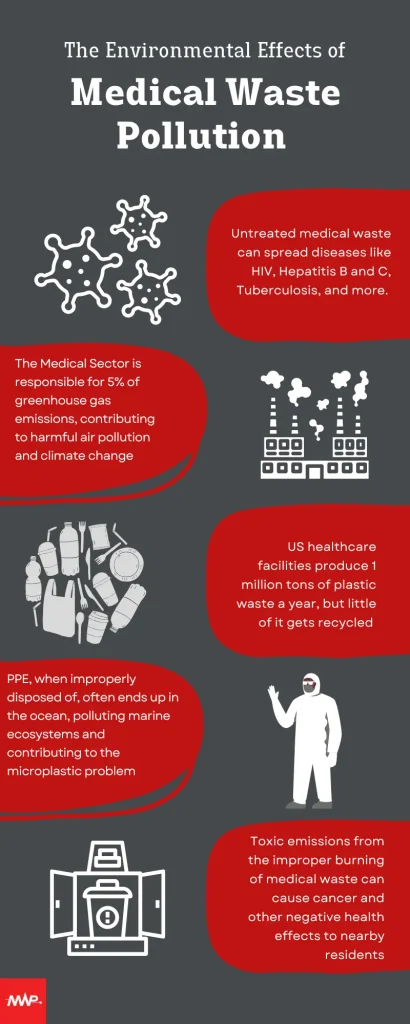Medical Waste Pollution and Its Effects on the Environment

Evaluating the environmental impact of the healthcare sector can be a complicated issue. The effects are significant, but in many ways unavoidable. Doctors and nurses on the front lines of treatment are more focused on saving their patients’ lives than on minimizing medical waste pollution, and that’s entirely understandable.
That being said, medical waste can be reduced and its effect’s minimized when proper procedures are put into place. Awareness of and adequate training in proper waste management can make a huge difference for the environment and for your facility. Safe disposal, reusable supplies, and global regulations are all important steps to reduce medical waste pollution and its effects on the environment.
Environmental Effects of Medical Waste Pollution

The worldwide response to the Covid-19 outbreak made medical waste more visible than ever. Discarded masks have become a common sight outside of the healthcare industry, spurring the question – what does medical waste disposal look like within our hospitals and clinics? Below, we will take a look at the environmental impact of medical waste and offer some solutions.
Health Hazards
Untreated medical waste may contain harmful microorganisms that spread disease. Medical waste is often linked to the passing of HIV, Hepatitis B and C, parasitic infections, Tuberculosis, and more. Used needles and other sharps can cause injury and exposure to infectious diseases.
Adverse health outcomes are also created by toxic exposure to pharmaceuticals, air pollution, and waterborne illnesses from pathogenic microbes in our water supplies. Improper incineration and sterilization treatments can cause chemical burns, radiation burns, and other thermal injuries.
In an unfortunate cycle, medical waste pollution adds to the pollution from other industries. It is reported that air pollution has killed three times more people than AIDS, tuberculosis, and malaria combined. These effects of pollution then require treatment, which creates more medical waste. The medical sector is not entirely to blame for air and water pollution, but at 5% of global greenhouse emissions, it’s not blameless either.
Excess Plastic Waste
We are all aware that excess plastic use has led to a global environmental crisis. Plastics are overrunning our oceans, killing wildlife, and contributing to climate change.
US healthcare facilities generate approximately 1 million tons of clean, non-infectious plastics every year, but very little is recycled. Single-use plastics make up at least 20% of medical waste, yet medical recycling systems are mostly inefficient or non-existent. Requiring recycling and replacing single-use disposables could greatly reduce the negative effects of medical waste.
PPE Pollution
Personal Protective Equipment (PPE) is essential for medical staff to stay healthy and safe while treating patients. PPE waste is unavoidable, making proper disposal imperative. According to the Multidisciplinary Digital Publishing Institute, almost any PPE medical waste that is not disposed of in landfills or incinerators ends up being discarded in the ocean. PPE waste pollutes marine ecosystems and indirectly threatens human health through the release of microplastics.
Toxic Emissions
Toxic emissions are released when medical waste is incinerated improperly. Waste materials that contain chlorine and heavy metals generate human carcinogens when burned. The World Health Organization (WHO) recommends methods that do not form chemicals or release hazardous emissions. Autoclaving, closed high-temperature incineration, and microwaving are preferred to open burning.
How to Minimize the Negative Effects of Medical Waste Pollution
Global Regulation
Climate change and air pollution affects every country in the world. Global regulations and enforcement are needed to create change in the healthcare industry and waste disposal as a whole. Global change can start with simple sustainability practices by you and your healthcare facility.
Reduce Medical Waste
Reducing medical waste is possible with simple changes. Unnecessary single-use supplies should be eliminated. Plastic gloves, for example, can be replaced with handwashing in many situations. Well-maintained reusable items can replace disposables. All clean plastics, paper, cardboard, glass, and metals should be recycled. Effective segregation ensures that appropriate materials are recycled and hazardous waste is properly handled.
Safe Disposal of Medical Waste
Safe disposal starts with a formal waste management plan. The plan should cover all aspects of managing medical waste, including:
- Appropriate training
- Proper segregation and containment
- Safe handling
- Storage and transport
- Treatment and disposal
Follow all local and federal regulations to maintain compliance and protect the environment. Partner with a professional medical waste disposal company to ensure that your waste is handled correctly.
Partner with Medical Waste Pros Today
Medical Waste Pros will connect you with trusted and experienced providers in your area. We responsibly dispose of all kinds of medical waste to protect the community and the environment. Give us a call at (855) 755-6370 or fill out the form to receive free quotes on our services today. We look forward to reducing the negative effects of medical waste with your organization.










